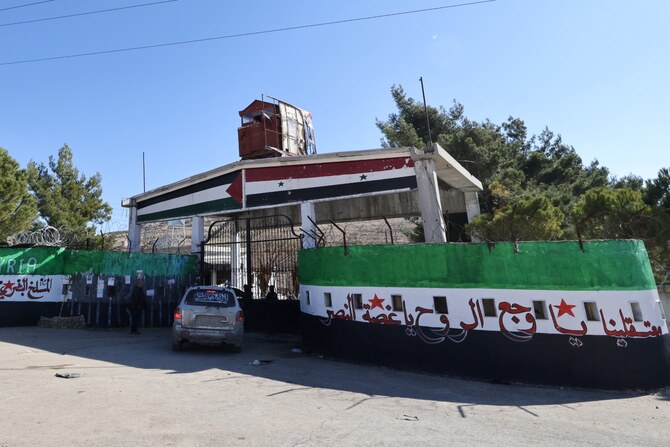GAZA/CAIRO: Israeli tanks battled their way to the center of Khan Younis on Sunday in a major new push into the heart of the main city in the southern Gaza Strip which is sheltering hundreds of thousands of civilians who fled other parts of the enclave.
Residents said tanks had reached the main north-south road through the middle of Khan Younis after intense combat through the night that had slowed the Israeli advance from the east. Warplanes were pounding the area west of the assault.
The air rumbled with the constant thud of explosions and thick columns of white smoke rose over the city. As morning broke near a city-center police station, the constant rattle of machine gun fire could be heard. Streets there were deserted apart from an old woman and a girl riding on a donkey cart.
“It was one of the most dreadful nights, the resistance was very strong, we could hear gunshots and explosions that didn’t stop for hours,” a father of four displaced from Gaza City and sheltering in Khan Younis told Reuters. He declined to be identified for fear of reprisals.
“In Khan Younis tanks reached Jamal Abdel-Nasser Street, which is at the center of the city. Snipers took positions on buildings in the area,” he said.

At the opposite end of the Gaza Strip, in northern areas where Israel had previously said its forces had largely completed their tasks, residents also described some of the most intense fighting of the war so far.
Israeli troops were pushing into militant strongholds and meeting fierce resistance in Jabaliya and the Shejjaiya district of Gaza City, areas that are still inhabited despite orders weeks ago to clear out of the entire north.
“I daresay it is the strongest battle we have heard in weeks,” said Nasser, 59, a father of seven sheltering in Jabaliya after his house was destroyed in Beit Lahiya, another northern area. Explosions could be heard as he spoke. “We are not going to leave Jabaliya regardless of everything. We shall die here as martyrs or they will leave us alone.”
Israel vowed to annihilate Hamas, which has ruled Gaza since 2007, after militants burst across the fence on Oct. 7 and went on a rampage through Israeli towns, gunning down families in their homes, killing 1,200 people and seizing 240 hostages.
Since then, Gaza’s health authorities say at least 17,700 people have been confirmed killed in Israeli strikes, with thousands more missing and presumed dead under rubble. The toll no longer includes figures from northern parts of the enclave, beyond the reach of ambulances and where hospitals have ceased functioning.
Who’s alive?
After weeks of fighting concentrated in the north, Israel launched its ground offensive in the south this week with a storm of Khan Younis. With combat now under way along nearly the entire length of the Gaza Strip, international aid organizations say the enclave’s 2.3 million people have been left with nowhere to hide.
At the site of one Khan Younis home that had been destroyed by bombing overnight, relatives of the dead were combing the rubble in a daze. They dragged the body of a middle-aged man in a yellow T-shirt from under the masonry.
“We prayed the nighttime prayer and went to sleep, then woke up to find the house on top of us. ‘Who’s alive?!’” said Ahmed Abdel Wahab.
“Three floors above collapsed down and the people are under it,” he said. “My mother and father, my sister and brother, all of my cousins.”
The main hospital in Khan Younis, Nasser hospital, has been overrun with dead and wounded. On Sunday there was no floor space left in the emergency department as people carried in more wounded wrapped in blankets and carpets. Mohamed Abu Shihab wailed and swore revenge for a son he said had been killed by an Israeli sniper.
The Israeli military said it bombed underground tunnel shafts in Khan Younis and attacked a squad of Palestinian gunmen preparing an ambush, but said nothing about any tank advance.
The vast majority of Gaza’s residents have now been forced from their homes, many fleeing several times with only the belongings they can carry. Israel says it is doing what it can to protect civilians, but even its closest ally the United States says it has fallen short of those promises.
An Israeli siege has cut off supplies, with the United Nations warning of mass hunger and disease.
At an international conference in Doha, capital of Qatar which acted as the main mediator for a week-long truce that saw more than 100 hostages freed, Arab foreign ministers criticized the United States for vetoing a UN Security Council resolution on Friday that demanded a humanitarian cease-fire.
Qatar’s Prime Minister Sheikh Mohammed bin Abdulrahman Al-Thani said the war risked radicalising a generation across the Middle East. Jordan’s foreign minister said the Israeli campaign aimed to drive Palestinians from Gaza and met the legal definition of genocide, accusations Israel called outrageous.
UN Secretary-General Antonio Guterres said he would “not give up” appealing for a cease-fire.
“I urged the Security Council to press to avert a humanitarian catastrophe and I reiterated my appeal for a humanitarian cease-fire to be declared,” Guterres said. “Regrettably, the Security Council failed to do it, but that does not make it less necessary.”
Israel has spurned demands it halt the fighting. Briefing his cabinet on Sunday, Prime Minister Benjamin Netanyahu said he had told the leaders of France, Germany and other countries: “You cannot on the one hand support the elimination of Hamas, and on other pressure us to end the war, which would prevent the elimination of Hamas.”

























